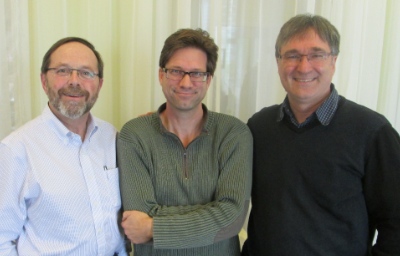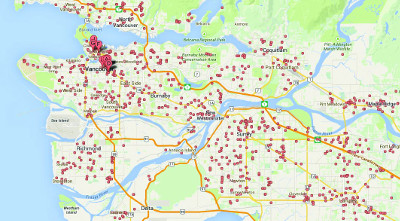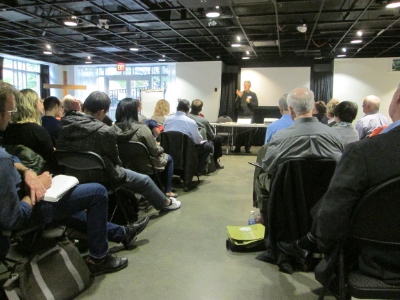
Glenn Smith (left) and Richard Long (right) with Jonathan Bird. They brought urban insights and expertise from Montreal and Ottawa respectively.
Everyone knows Metro Vancouver is routinely listed among the ‘most liveable’ cities in the world. Innovations in urban planning and development here are directly influencing the growth and character of cities across the planet.
So what is the role of the local church in this – not just individual congregations but the collective body of Christ in our city region? What might healthy transformation look like in our neighbourhoods and cities, if people and places could flourish under the influence of Jesus’s kingdom?
Given the prominence of the city in which we bear witness to the gospel, and if God’s command to the Jewish exiles – “seek the wellbeing of the city to which I am sending you, for in its wellbeing you will find your own” (Jeremiah 29:7) – applies to the church here, then might God be preparing us to play a role in helping shape both global urbanism and the global church? What are some practical steps for cooperative mission that build on the ways in which congregations, ministries and individual Christians are sinking deep roots in their local contexts?
These questions brought together more than 100 pastors, parachurch executives and lay leaders for an afternoon of visioning and training at the Tools for Neighbourhood and City Transformation event November 6.
Highlights: Tools for Neighbourhood and City Transformation
Here are a few highlights from presentations by urban experts Glenn Smith, Richard Long and Ray Bakke, and from the dialogue that followed.
1. Vancouver is no longer the back door to Europe, it is the physical and cultural gateway to Asia. The flow of people and ideas into and out of our region make us an ideal laboratory for 21st century urban mission, not least for the way in which Western Christianity and Asian Christianity (including Middle Eastern Christianity) can learn from each other.
2. To love our city, we must first know it. If we don’t love our city, it will undo us.
3. Getting to know our neighbourhoods and cities requires personal curiosity and systematic, collective effort. We need to become just as skilled at reading our local settings as we are at exegeting the Bible. Everyone has insights to contribute. We must be open to learning from and being changed by who and what we encounter along the way. Otherwise we will labour in vain, and possibly to our harm.
4. Every city – and neighbourhood – has unique qualities and challenges. The church in Metro Vancouver needs to discern what should be the key indicators of well-being in our region, so that we can set clear objectives for our efforts and monitor our progress. In this we need to be part of the broader civic dialogue around us, but also be bold to emphasize how the gospel inflects our priorities and approach.
5. Stay put and stay at it, over the long haul. City transformation requires years, if not generations. Continuity of vision and leadership are critical. A city is shaped by, and gives shape to, what the Canadian philosopher Charles Taylor calls the “social imaginary” of its citizens. Think of it as the moral order that emerges from all the ways in which we live together in this place, the image we have of ourselves and the good life we aspire to make here. Our gospel task is to fashion new habits, new spaces and new stories about our (public and personal) life together which over time can yield a healthier social imaginary.
6. Our fastest-growing churches tend to be immigrant churches – both in the number of attendees per church and in the number of new churches started. If we have been praying for God to send us labourers for the harvest, these are them. They can teach us much, but they in turn need our support.
7. Bakke, Smith and Long all emphasized – though each comes from a different evangelical Protestant tradition – that long-term city transformation is impossible without Roman Catholic participation.
8. City transformation results mostly from the combined effect of many local efforts (and broad but specialized networks) that are increasingly conscious of their place and value within both the body of Christ and the fabric of the city. This requires a small organization to serve (not dictate) the cooperative mission of the church by connecting the different parts of the church to each other, facilitating dialogue that clarifies the Spirit’s leading, and helping to locate resources that build capacity.
9. Personal and corporate prayer is absolutely vital to every aspect of neighbourhood and city transformation.
Next steps

The Christian community must cooperate in prayer walking, place-making, exegeting neighbourhoods – and much more – if we are to truly understand our city.
The big questions that brought us together couldn’t, of course, be answered in one afternoon. So one of the next steps we identified was to re-convene for more discussion and networking during Missions Fest at the end of January.
But we also wanted to get practical immediately. In the first week of December there will be a prayer walk in a Vancouver neighbourhood, with discussion afterward about using prayer walks within a larger strategy to become rooted in your parish.
And on February 5, Glenn Smith will be back in town to give a full-day workshop on how to use his 20-step method of collectively exegeting (reading) a neighbourhood.
For more information about these upcoming opportunities and to hear stories of neighbourhood transformation and cooperative mission in Metro Vancouver, stay tuned to Church for Vancouver and subscribe to CityGate Leadership Forum’s monthly newsletter, Rooted: Christians Discovering Their Neighbourhoods.

